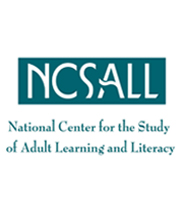What changes occur in the lives of adult learners when they participate in literacy programs? The outcomes of participation in adult literacy programs have typically been measured in terms of gains on standardized tests and/or passing the General Educational Development (GED) exam. The other positive changes occurring in students’ lives, especially those outside the classroom, generally are not assessed, perhaps because they are difficult to track and to measure. A recent longitudinal study of adult literacy learners in Tennessee found a variety of outcomes in learners’ lives, including an increased rate of employment, increased self-esteem, and increased community participation. Perhaps, rather than taking workforce preparation as an isolated objective, adult basic education needs to be seen as a process through which participants gain skills and confidence, enabling them to be truly productive members of the modern society, as workers, citizens, and family members.
In an effort to assess the long-term impacts of adult literacy programs, the Center for Literacy Studies (CLS) conducted the Longitudinal Study of Adult Literacy Participants in Tennessee from 1991-1995. The purpose of the study was to identify if and how participation in literacy programs impacted the lives of adults. The study focused on changes in the lives of 450 participants in the domains of work, family, and community after they enrolled in literacy programs. The participants from three cohorts (1991-92, 1992-93, and 1993-94) were enrolled at literacy Level One, and their initial scores on the ABLE (Adult Basic Learning Exam) reading test were below the sixth- grade level. Follow-up surveys were administered annually through 1995, although the number of participants who could be located diminished each year. Two interim reports were published by the Center for Literacy Studies in 1993 and 1994 (Merrifield, Smith, Rea, Shriver, 1993 and Merrifield, Smith, Rea, Crosse, 1994).
This final report examines the responses of the 199 adults from the three cohorts who took part in a follow-up interview approximately one year after their initial enrollment. Results reported here are based on their responses to 116 questions dealing with employment, literacy practices, involvement with children’s schooling, community awareness, self-esteem, and life satisfaction.


